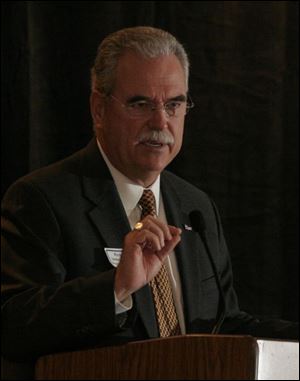
Joint effort called key in health care reform
3/1/2008
Richard Umbdenstock, a top leader of the American Hospital Association, speaks locally.
The first step in U.S. health care reform is deciding whether all Americans should have insurance - not philosophical debates among Democratic presidential candidates about how much coverage should be mandated, a national hospital trade association leader said in Toledo yesterday.
And working out the best, nonpartisan way to expand health-care coverage will take cooperation among hospitals, insurance companies, doctors, government, and others. Otherwise, reform efforts will fall apart as they did in the 1990s, said Richard Umbdenstock, president and chief executive of the American Hospital Association.
"We can't afford to have that happen again," Mr. Umbdenstock told nearly 100 people at South Toledo's Gladieux Meadows. The event was sponsored by the Hospital Council of Northwest Ohio and Toledo Regional Chamber of Commerce.
He added, "We have to work together to make it happen."
The failing economy will dominate this year's political environment, and affordable health care has become a key issue, Mr. Umbdenstock said.
Hillary Clinton wants mandated coverage for everyone; fellow Democrat Barack Obama has proposed mandating coverage for children only, and Republican John McCain opposes mandates.
A lack of insurance coverage nationwide and potential cuts in government programs are concerns for hospitals, Mr. Umbdenstock said.
The number of uninsured Americans is on the rise, and up to 80 million are uninsured at some point in a year, Mr. Umbdenstock said.
With President Bush looking to continue cutting Medicare and Medicaid, which make up 55 to 60 percent of the average hospital's revenues, providers will be shifting more costs to private insurance, he said.
Hospitals nationwide are working to improve internal performance on safety, effectiveness, efficiency, and other factors as part of their efforts toward health-care reform, Mr. Umbdenstock said.
While public policy has zeroed in on providing health-care coverage for everyone, efficiency and quality are some other factors that need to be addressed. Another is shifting medicine's focus from treatment to wellness and preventing diseases, he said.
"Overall, the system is consumption and treatment driven," he said. "We've got to change that."